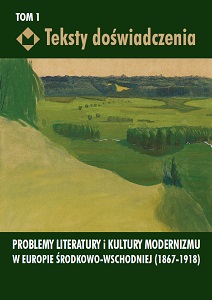Cyprian Norwid i Żydzi
Cyprian Norwid and Jews
Author(s): Karol Samsel
Subject(s): Cultural history, Studies of Literature, Theory of Literature
Published by: Wydawnictwa Uniwersytetu Warszawskiego
Keywords: Cyprian Norwid; Maccabees; Israel; philoantisemitism; christianity; Haskalah
Summary/Abstract: Norwid’s view on Jews, and also – on all the history of Juda Nation – has changed many times. Also the problem has met in norwidology with many reliable neverthless generalising opinions. The aim of this particular study differs from other studies, because it deals with the most controversial and complex problems of Norwid’s view on the acts of The Chosen Nation. Antagonisms disturbing Norwid’s opinion in this case are particularly visible in the period between the time of writing Promethidion (1851) and the time of preparing and creating Quidam (1854–1859). First of all – Norwid is the poet of the strong Christian view of the world. That truly affects the ambivalent way of seeing Jews – in accordance with the principle odi et amo we can talk about Norwid’s philosemitism and antisemitism at the same time, about modernity in regarding so called The Jewish question and about an obscurance. Second of all – he is a poet-philosopher and in 1850’s he tries to apprehend the historical sigma of Jewish nation and define (also from eschatological point of view) its historiosophy. Third of all – in Paris Norwid is isolated from changins discussion about Jews that take place in Poland. Separation however has in that case both good and bad results. Eventually – unusually intimate Norwid’s struggle with the problem of Jews, especially long-term building the philoantisemitic attitude to ‘our elder brothers in faith’, set an example of modernist laboratory of forming the idea. One can say that all the Polish inteligence, especially that part of it, which had decided to adjust its Jewish issues from the ‘cabinet-like’ point of view, solved the problems with so called The Jewish question in a similar way.
Book: Teksty doświadczenia. Tom 1
- Page Range: 247-280
- Page Count: 34
- Publication Year: 2017
- Language: Polish
- Content File-PDF

